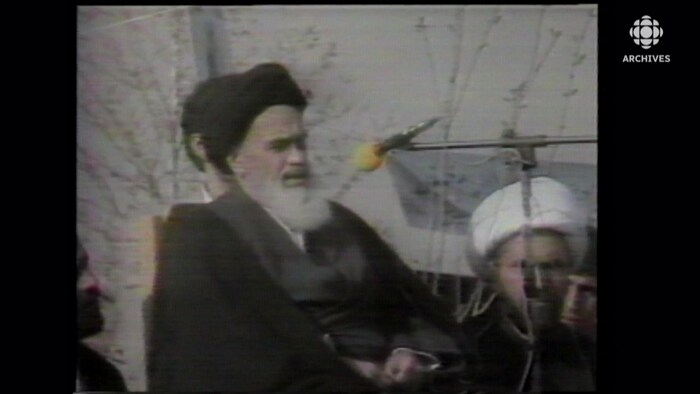Open in full screen mode At the beginning of 1979, the Iranian revolution accelerated . Radio-Canada Speech synthesis, based on artificial intelligence, makes it possible to generate spoken text from a written text. On February 1, 1979, the course of the Islamic revolution in Iran accelerated with the triumphant return of its main spiritual leader, Ayatollah Khomeini. In the weeks that follow, Radio-Canada offers reports and reports that observe the progress and evolution of this important event on a global scale. In Iran, at the beginning of 1979, a revolution inspired by the Islamic religion had been sweeping for months and forced Emperor Mohamed Reza Shah Pahlavi to leave his country. Report by correspondent Lucien Millet on the return of Ayatollah Khomeini to Iran On February 1, 1979, the Téléjournal, hosted by Bernard Derome, presented an account by Radio-Canada correspondent Lucien Millet who witnessed a pivotal event in this revolution. The spiritual leader of the revolt against the imperial regime, Ayatollah Khomeini, gets off a plane that has just landed at Tehran airport. Loading ELSE ON NEWS: Netanyahu gives the green light to an offensive in RafahLoading in progress ELSE ON NEWS: Netanyahu gives the green light to an offensive in Rafah Lucien Millet observes the triumphant welcome given by the people to Ayatollah Khomeini. Will the arrival of the main symbol of religious opposition to the Iranian imperial regime be enough to ensure the definitive victory of the Islamic revolution? Indeed, on February 1, political control of the country remains very fluid, even uncertain. Several elements, the military for example, remain loyal to the imperial regime. The Ayatollah Khomeini tries to convince these recalcitrant elements to abandon the crown and rally behind regime change. Report by correspondent Lucien Millet on the victory of the Islamic revolution in Iran In just 11 days, the last elements favorable to the old regime rallied to the Islamic revolution, as confirmed by another report by correspondent Lucien Millet presented to Téléjournal on February 12, 1979. Bernard Derome hosts the Téléjournal. La garde Imperial surrendered. The prime minister previously appointed by the shah, Chapour Bakhtiar, resigned. Almost all of Iranian territory is now controlled by the new revolutionary government. Ayatollah Khomeini was indeed able to appoint a new cabinet headed by Prime Minister Mehdi Bazargan. Now that the success of the revolution has been achieved, Ayatollah Khomeini asks his supporters to silence their weapons and stop fighting in order to prevent the situation from turning into anarchy. At the same time, Iranian airports are closed to prevent those who opposed the victory of the revolution from fleeing abroad. Ayatollah Khomeini's main problem now is to iron out the rivalries within the new regime and ensure the unity of the country. Correspondent's report on the results of the referendum on the establishment of the Islamic Republic of Iran On March 31, 1979, the host of the Téléjournal, Jean Ducharme, reports to us that Iranian voters have ratified by referendum the establishment of the Islamic Republic of Iran. At first glance, the approval by the Iranian people appears massive. Jean Ducharme notes, however, that abstention seems to have been high where certain ethnic minorities live. There would also have been a certain level of abstentionism among the wealthiest classes in the country. The correspondent Lucien Millet presents us with the following an interview with Prime Minister Mehdi Bazargan. He, in excellent French, refutes that the Islamic revolution is dictatorial in nature. Moreover, underlines the leader, few opponents of the new regime have been executed. Those who were were considered, indisputably, to be serious criminals. Their punishment, however, respected the rule of law, says the Prime Minister. Report by correspondent Lucien Millet on the evolution of the Islamic revolution in Iran On April 15, 1979, Lucien Millet presented to the Téléjournala report which describes the evolution of the situation in Iran. The journalist underlines that Ayatollah Khomeini seems to want to lead the Islamic revolution with a very firm hand. This toughening is perhaps part of a desire to control certain fanaticized segments of the population prone to causing disorder, the journalist suggests. Moreover, certain initial excesses of the revolution seem abandoned. Women, for example, appear to have won the battle over the obligation to wear the Islamic veil, which seems to have been abandoned by the revolutionary authorities. Lucien Millet concludes, however, that the Iranians are looking for themselves in this Islamic revolution whose main impulse remains essentially the rejection of the values of Western civilization. This impulse, we will observe later, will often color the course of this revolution in the years to come.
Netanyahu gives the green light to an offensive in Rafah
Netanyahu gives the green light to an offensive in Rafah
Also read:
Archive | In early 1979, Radio-Canada observed the revolution in Iran

